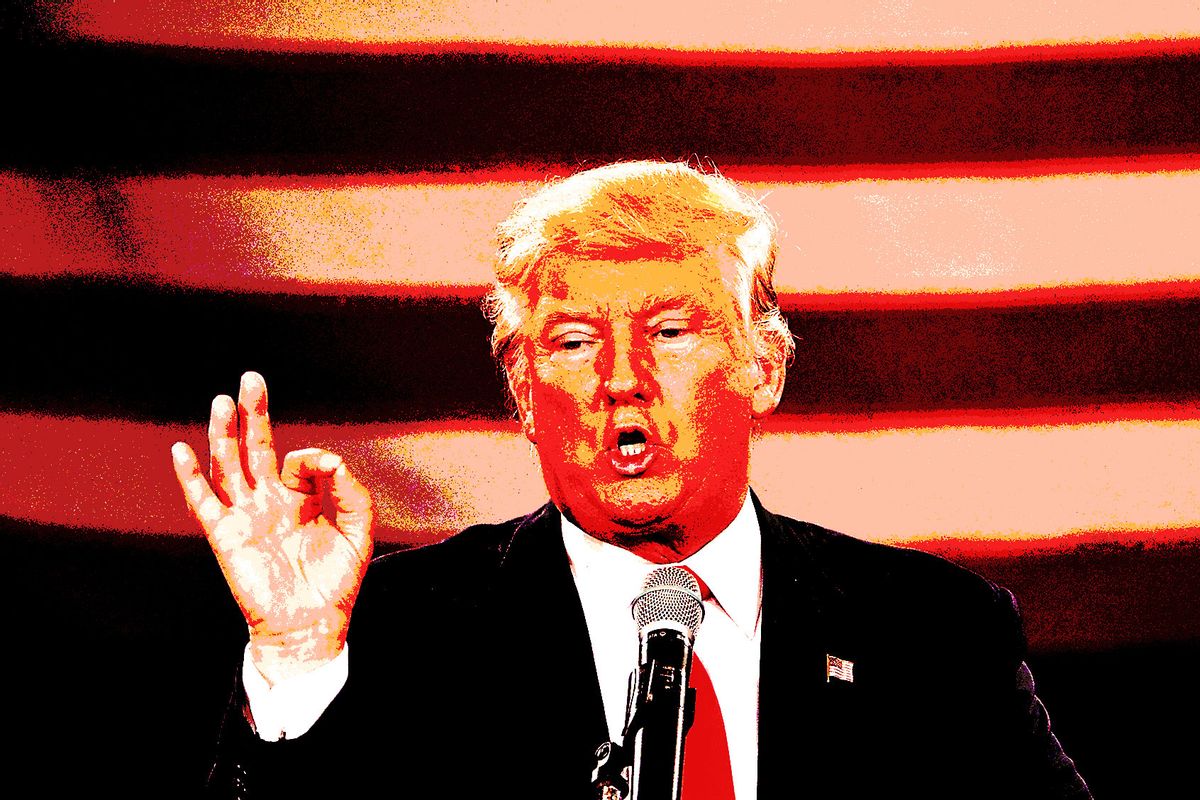In the final months of his presidency, Donald Trump ordered nuclear energy to be tested on the moon by 2027, as well as the development of nuclear-powered spacecraft that would orbit the Earth, the moon and outer space.
He also ordered the development of micro nuclear reactors small enough that they could fit inside a typical shipping truck that zips cargo along the highway.
During this period, the media was busy reporting on the Jan. 6 riots, insurrection and false accusations of voter fraud — and few paid attention.
However, these orders may offer clues about what was included in some of the 'Top Secret' folders squirreled away in Mar-a-Lago.
On Dec. 16, 2020, Trump signed the "Space Policy Directive-6," which set the goal of testing nuclear energy on the moon by 2027.
Then on Jan. 5, 2021, — the day before the Jan. 6 insurrection — Trump signed Executive Order 13972, which directed NASA, the Department of Energy and the Department of Defense to study the cost and technical feasibility of using nuclear-powered spacecraft and satellites.
Some of these spacecraft would orbit the Earth, but most of the nuclear-powered craft would be meant for deep space missions to Mars and further places that are light years away.
There are Trump supporters, including Tesla founder Elon Musk, who support the goal of using nuclear power to help humans set up mining operations on the moon and colonize Mars.
The Jan. 5 Executive Order also includes Trump's direction to NASA and the Department of Defense to design and build micro nuclear reactors that could be transported on trains, planes or the typical trailer truck.
The Biden Administration has embraced a similar idea and is developing small reactors that could supply electricity for 1,000 to 10,000 soldiers in remote desert, jungle and mountain terrains. The microreactors could also be used to plug holes in America's grid in transformers that fail due to terrorist attacks, wildfires or other natural disasters.
The new effort is called "Project Pele," named after the Hawaiian goddess of fire and volcanoes. The DOD recently announced that it would review proposed designs for "Project Pele" and choose a winner before building and testing it in Idaho.
In folktales, Pele could destroy a city or a beach by hurling lava and ash. Micro-nuclear reactors pose potential dangers, too. It could be catastrophic if terrorists got ahold of them, for example.
Although saving the coal industry was a focal point for Trump's Department of Energy, whistleblowers were alarmed by his nuclear negotiations in 2018.
They claimed Trump secretly authorized the sale of nuclear technology, made by a company called IP3, to Saudi Arabia. The deal was intensely negotiated by Trump's fired and disgraced advisor, Lt. Gen. Michael Flynn, who had close ties to IP3.
The deal Flynn negotiated didn't require the Saudis to agree they wouldn't use the technology to make nuclear weapons.
These whistleblowers went to Congress — and the reaction there was a rare bipartisan alarm.
Sen. Marco Rubio (R-FL) teamed up with Sen. Bob Menendez (D-NJ) of New Jersey to request the GAO investigate. The GAO noted that Congress and the State Department were left out of the loop in the negotiations. State diplomats would have been savvier about how Saudi Arabia's shifting, complicated and secret alliances might put America at risk.
Interestingly, conservative think tanks recently issued reports detailing how entrenched anti-American Wahhabi extremists were inside the enormous Saudi royal family.
Investigators discovered that IP3 simply wrote one executive order that Trump could sign so his aides could simply cut and paste it onto White House stationery.
Trump's Jan. 5, 2021 order and his December 16, 2020 order both stress the importance of letting private industry, rather than the government, take a leadership role in achieving America's nuclear goals.
For years, NASA has debated nuclear-powered craft to carry explorers to Mars. Nuclear craft could achieve faster speeds, cutting down the time astronauts spent traveling through high levels of radiation that would bombard them in outer space.
There are potential wealthy investors who see mining on the moon as a cosmic jackpot. PayPal founder Rod Martin, former special counsel to conservative tech billionaire Peter Thiel, appeared on a 2021 Right Response Ministries podcast to explain how God is directing Martin's hedge fund to invest in colonizing the moon and Mars.
One incentive is what Martin described as the vast wealth of "Helium 3" — a rare substance needed in nuclear energy production — waiting to be harvested from the moon's surface.
In the podcast, Martin announced he had created a certification process for financial advisors, taught at evangelical Liberty University. He also expressed admiration for Tesla billionaire Elon Musk's efforts at space exploration.
But Martin promised listeners that his aerospace ventures would be guided by "Christian principles of liberty, security, values."
He then urged listeners to tell their financial advisers to enroll in his certification courses and claimed his board of directors included retired Air Force and Space Force generals.
Trump's 2020 nuclear goals went uncriticized by most world leaders, although one unnamed Chinese official remarked to Xinhua News Agency that testing nuclear energy on the moon could violate a 1979 United Nations treaty that bans weaponizing the moon.
As for Russia, just days after the FBI search at Mar-a-Lago, the state-owned TV network Russia One aired and tweeted news anchor Eugeny Popov gloating that Russian officials already had the top secret nuclear documents that Trump had taken out of the White House. And he said that Russia's military and intel agents were busy reviewing them.
Watch below:




Shares